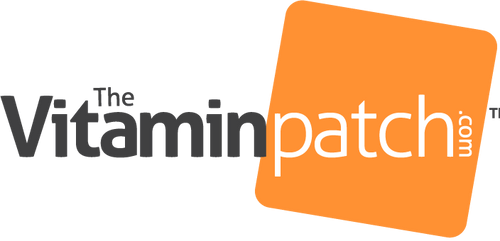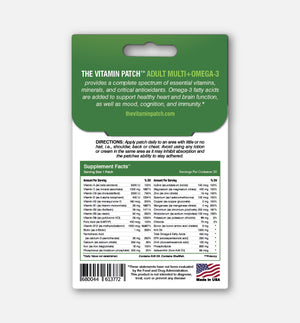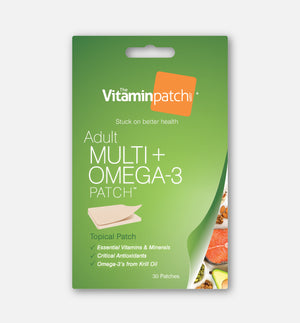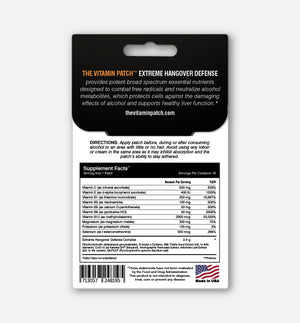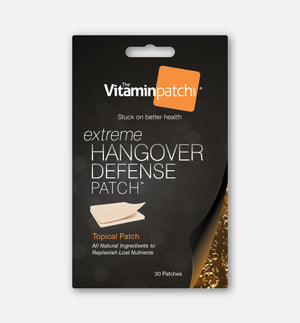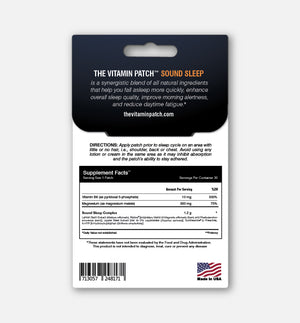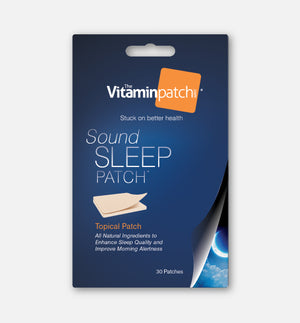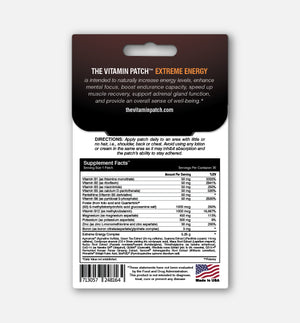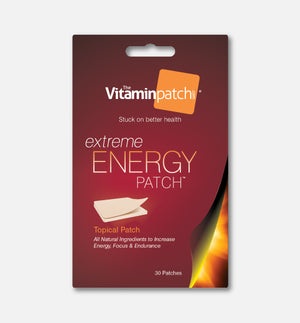Navigating the world of vitamins, minerals, and supplements can sometimes feel like deciphering a puzzle. Yet, understanding these essential nutrients is key to unlocking our body's potential for optimal health and well-being.
If you're curious about why you need these nutrients and want convenient, effective solutions, explore our vitamin patches, designed to deliver essential nutrients directly into your bloodstream. Read on to discover clear insights into their importance, sources, and potential risks of deficiencies associated with these vital nutrients.
If you're curious about why you need these nutrients and want convenient, effective solutions, explore our vitamin patches, designed to deliver essential nutrients directly into your bloodstream. Read on to discover clear insights into their importance, sources, and potential risks of deficiencies associated with these vital nutrients.
Take a look at out FREE downloadable nutritional guides to support your wellness journey!
Vitamin A
Vitamin A (also known as retinol) is essential for healthy vision, immune function, and skin health. It can be found in foods like carrots, sweet potatoes, and spinach. Deficiency can lead to nigh blindness and compromised immunity.
Vitamin B1 - Thiamine
Thiamine is crucial for energy metabolism and nerve function. Sources include whole grains, nuts, and pork. Serious deficiencies can cause beriberi (a disease causing inflammation of the nerves and heart failure), impacting the nervous system and heart health.
Vitamin B2 - Riboflavin
Riboflavin supports energy production and skin health. It's found in dairy products, lean meats, and leafy greens. Deficiency may lead to cracked lips and skin, and inflamed tongue.
Vitamin B3 - Niacin (Nicotinic Acid)
Niacin also helps to improve circulation and has been shown to suppress inflammation. Foods like meat, fish, and peanuts are good sources, but deficiencies can result in pellagra, characterized by skin rashes and digestive issues.
Vitamin B5 - Pantothenic Acid
Pantothenic acid is vital for metabolism and hormone synthesis. It's present in chicken, eggs, and whole grains. Deficiency is rare, but can lead to fatigue and numbness.
Vitamin B6 - Pyridoxine
Pyridoxine is important for brain function and the nervous system. Sources include bananas, chicken, and fish. Deficiency may cause anemia and neurological issues.
Vitamin B7 - Biotin
Biotin supports healthy hair, nails, and skin and is present in foods like eggs, nuts, and salmon. Deficiency can lead to brittle nails and hair loss.
Vitamin B9 - Folate (Folic Acid)
Folate is crucial for cell division and fetal development. It's found in leafy greens, beans, and citrus fruits. Deficiency can cause anemia and birth defects.
Vitamin B12 - Cyanocobalamin
Vitamin B12 is essential for nerve health and red blood cell production. Sources include meat, dairy, and fortified cereals. A lack of B12 can result in fatigue and nerve damage.

Vitamin C
Vitamin C is important for immune function and collagen synthesis. Your body cannot produce Vitamin C, but it is abundant in citrus fruits, berries, and bell peppers. Deficiency could lead to scurvy, with symptoms like bleeding gums and fatigue.
Vitamin D
Vitamin D is crucial for bone health and immune function. Sunlight exposure, fatty fish, and fortified dairy products are good sources. Deficiency can cause rickets in children and bone weakness in adults.
Vitamin E
Vitamin E is an antioxidant that protects cells from damage. Sources include nuts, seeds, and vegetable oils. Deficiency is rare but may cause nerve damage.
Vitamin K
Vitamin K is essential for blood clotting and bone health. Leafy greens, broccoli, and soybean oil are good sources, and deficiency can lead to excessive bleeding.


Beta-carotene
Beta-carotene converts to Vitamin A and is important for vision and skin health. It's found in carrots, sweet potatoes, and kale. Deficiency may affect sight and immune function.
Calcium
Calcium is vital for strong bones and teeth. Dairy products, leafy greens, and tofu are good sources, but a lack of calcium can cause osteoporosis and weak bones.
Chloride
Chloride is an electrolyte important for fluid balance and nerve function. It's found in table salt and many processed foods. Although deficiency is rare, it can occur in severe cases of dehydration.
Chromium
Chromium helps to regulate blood sugar levels and can be found in broccoli, whole grains, and lean meats. Deficiencies can result in an impaired glucose tolerance.
Copper
Copper supports iron metabolism and connective tissue formation. Nuts, shellfish, and organ meats are rich in copper, but a lack of this mineral can cause anemia and osteoporosis.
Collagen
Collagen supports skin elasticity and joint health. Deficiencies can result in aging skin and joint pain, so it is important that you have the correct intake in your diet. It is often found in bone broth, fish, and chicken skin.
Fluoride
Fluoride strengthens tooth enamel and prevents cavities. It is added to drinking water and is present in seafood, but deficiencies can lead to dental decay.


Iron
Iron is vital for oxygen transport in the blood, and is rich in foods such as red meat, lentils, and spinach. However, iron deficiencies can cause anemia with symptoms like fatigue and pale skin.
Iodine
Iodine is crucial for thyroid function and metabolism. Seafood, dairy, and iodized salt are good sources, but a lack of iodine can lead to goiter and thyroid dysfunction.
Magnesium
Magnesium supports muscle and nerve function; it also helps to manage your stress response. It can be found in nuts, seeds, leafy greens, avocado, and bananas. A magnesium deficiency can lead to muscle cramps and abnormal heart rhythms.
Omega-3
Omega-3 fatty acids support heart health and brain function, reduces inflammation, and boosts collagen production. Fatty fish, flax seeds, and walnuts contain Omega-3, but deficiencies may lead to cardiovascular issues and cognitive decline.
Potassium
Potassium is essential for heart and muscle function. Bananas, potatoes, and beans are potassium-rich foods, but a lack of potassium can lead to muscle weakness and irregular heartbeat.
Sodium
Sodium is an electrolyte important for fluid balance and nerve function. It's found in table salt and processed foods. Excessive intake can lead to high blood pressure, while a lack of sodium is often caused by drinking too much water and can cause loss of energy, nausea and vomiting.
Sulfur
Sulfur is a component of amino acids that helps to form proteins. Eggs, garlic, and onions are good sources; although deficiency is rare, is can affect joint health.
Zinc
Zinc supports immune function and wound healing. Oysters, red meat, and nuts are good sources, but a zinc deficiency can weaken immunity and delay wound healing.
Remember that understanding the world of vitamins, minerals, and supplements starts with understanding your own body's needs! Ready to take the next step? Discover personalized recommendations tailored to your lifestyle and health goals by taking our vitamin quiz.
Explore our range of vitamin patches designed to deliver essential nutrients and begin your journey towards a healthier, more vibrant you today!
Explore our range of vitamin patches designed to deliver essential nutrients and begin your journey towards a healthier, more vibrant you today!
